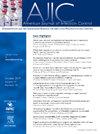Harnessing the power of infection prevention and public health data systems to support health care in Washington State during the COVID-19 pandemic
IF 3.8
3区 医学
Q2 INFECTIOUS DISEASES
引用次数: 0
Abstract
Background
State health departments’ (SHD) role in infection prevention and control (IPC) includes robust educational and consultative services for various health care settings. During the COVID-19 pandemic, Washington-SHD (W-SHD) IPC staff conducted remote and on-site Infection Control Assessment and Response (ICAR) consultations for long-term care (LTC) and non-LTC health care facilities.
Methods
ICAR consultations were classified as “reactive” in response to a COVID-19 outbreak or “proactive” to help facilities improve IPC protocols. Facility addresses were geocoded to census tracks, classifying urban or rural areas. Facility types and characteristics were analyzed, assessing the impacts of repeat visits. All descriptive statistics, Pearson’s χ2 tests, and odds ratios were calculated.
Results
Between March 2020 and December 2022, W-SHD conducted 3,093 ICARs at 1,703 health care facilities in 94.9% (37/39) of Washington counties. Of the total visits, most were in LTC (90.5%) and 48.9% were reactive. Facilities with initial on-site ICARs had 1.5 times the odds of having a repeat visit than facilities with initial remote visit (95% CI: 1.21, 1.87).
Discussion
Maintaining strong connections with health care facilities can help bolster infection prevention practices and minimize loss of information at the facility level.
Conclusions
Evidence-based findings on the sustainability of the W-SHD’s ICAR services during the COVID-19 pandemic illustrated the value of public health IPC programs.
利用感染预防和公共卫生数据系统的力量,在 COVID-19 大流行期间为华盛顿州的医疗保健提供支持。
背景:州卫生部门(SHD)在感染预防和控制(IPC)方面的职责包括为各种医疗机构提供强有力的教育和咨询服务。在 COVID-19 大流行期间,华盛顿州卫生局(Washington-SHD)的 IPC 工作人员为长期护理和非长期护理医疗机构提供了远程和现场感染控制评估与响应(ICAR)咨询:ICAR咨询分为 "反应性 "和 "前瞻性 "两种,"反应性 "是为了应对COVID-19疫情,"前瞻性 "是为了帮助医疗机构改进IPC协议。根据人口普查轨迹对医疗机构地址进行地理编码,并对城市/农村地区进行分类。对设施类型和特征进行分析,评估重复访问的影响。计算了所有描述性统计、皮尔逊卡方检验和几率比:在 2020 年 3 月至 2022 年 12 月期间,西澳大利亚州卫生和人类发展部在西澳大利亚州 94.9% 的县(37/39)的 1 703 家医疗机构进行了 3 093 次 ICAR。在所有访问中,大多数访问是在 LTC(90.5%),48.9% 是反应性访问。与初次远程访问的机构相比,初次现场 ICAR 的机构再次访问的几率是初次远程访问的机构的 1.5 倍(95%CI:1.21, 1.87):讨论:与医疗机构保持紧密联系有助于加强感染预防实践,并最大限度地减少机构层面的信息丢失:以证据为基础的研究结果表明,在 COVID-19 大流行期间,世界卫生组织的 ICAR 服务具有可持续性,这说明了公共卫生 IPC 计划的价值。
本文章由计算机程序翻译,如有差异,请以英文原文为准。
求助全文
约1分钟内获得全文
求助全文
来源期刊
CiteScore
7.40
自引率
4.10%
发文量
479
审稿时长
24 days
期刊介绍:
AJIC covers key topics and issues in infection control and epidemiology. Infection control professionals, including physicians, nurses, and epidemiologists, rely on AJIC for peer-reviewed articles covering clinical topics as well as original research. As the official publication of the Association for Professionals in Infection Control and Epidemiology (APIC)

 求助内容:
求助内容: 应助结果提醒方式:
应助结果提醒方式:


